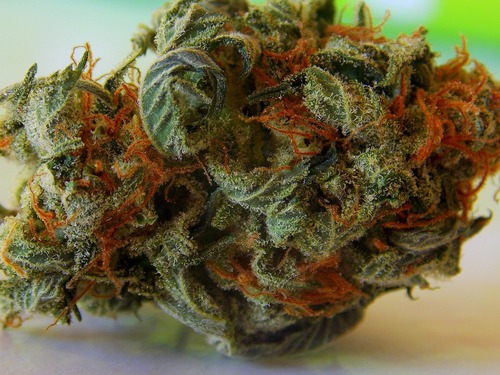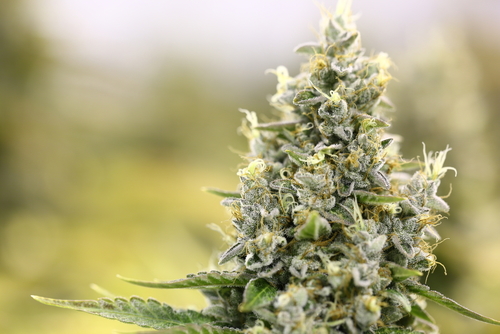Short answer
Marijuana has modest potential as medicine. The science behind what it does to the brain and the lungs are still unclear.
Long answer
Smoking marijuana is bad for the lungs - their lining of epithelial cells is amongst the most sensitive in the body and react poorly to any form of smoke. The relationship between marijuana and lung cancer is still unclear, as is the amount of tar delivered by smoking a joint; if you do choose to smoke marijuana, however, smoke it without tobacco, which is a well-established carcinogen.
What about marijuana as medicine? It's well established that marijuana stimulates the appetite - it gives you what are colloquially called "the munchies." This can be good for someone who's afflicted with HIV/AIDS, is in chemotherapy, or dealing with another condition that limits their appetite. It also works about as well as pharmaceutical treatments for reducing nausea. There's a weaker body of evidence that cannabis can effectively modulate chronic pain - especially in inflammation-related conditions like arthritis.
None of these are what doctors call "first line" treatments - right now they're understood best as supplements, rather than replacements, for current medical tech. That's for a couple of reasons. One is effectiveness; so far, the effects listed above can be done just as well or better with pharmaceuticals. Dosing is tricky with marijuana; smoking a joint or eating an edible isn't an effective way to deliver a quick or consistent dose.
There are adverse effects to be considered, too: they include bronchitis, depression, and elevated risk of motor vehicle collisions. Marijuana is psychoactive, and reactions to the high range from discomfort to panic. Marijuana use, like any habit, can become a compulsive behavior - in some cases, compulsive use can interfere with your work, your relationships, and other aspects of your life. Finally, there's not a strong body of research around any of the individual effects of marijuana; it's still a schedule one drug in the United States, so it's difficult to obtain federal money for research to better understand how to use it as a medicine.
There's a modest body of evidence that you can reduce the size of some tumors by exposing them to THC in a preclinical setting. What does that mean? Put cancer cells in a petri dish and dose them directly with THC, and sometimes they'll stop growing or start to die off. That's true some of the time with certain kinds of cancers, some of the time - different studies show different things. Other cancers haven't shown much of a reaction to THC in the lab. These are laboratory studies - there's little evidence so far that you can stop or shrink tumors by smoking a joint.
The science on marijuana and the brain is mixed. What we know with confidence is that regular marijuana use increases the risk of developing psychosis and schizophrenia. What's still unclear is the degree to which marijuana "draws out" existing genetic predispositions to these conditions - they could be inherited and lying dormant or brought on whole cloth from healthier brains by the use of the drug itself.
A relatively small study published in the Proceedings of the National Academy of Sciences showed that heavy marijuana users have thinner gray matter in their orbitofrontal cortexes - a brain region which has been linked to addiction by other research. Other studies have shown that regular marijuana use leads to greater connectivity between regions of the brain. The reliability of these effects, and their relationship to cognition and memory is still not well understood.
A study by a pair of researchers from Duke University on pot-smoking teenagers in New Zealand generated a lot of news coverage in discussion - in part because, at more than a thousand participants, it had a much larger sample than many of the other studies that have looked at marijuana and the brain. They found a decline in IQ in cannabis users who had started smoking early in life and continued through age 38. Their findings were muddied by a Norwegian scientist who reassessed the data; the IQ drop could be explained by marijuana use, according to him, or it could be due to socioeconomic factors. More research is still needed to untangle those causes.
Driving under the influence of pot has not been demonstrated to be safe. Closed-course and driving simulation studies have shown that driving high slows reaction times hitting the brakes or changing lanes. These data points have not yet been matched in the literature with studies demonstrating an increase of traffic accidents where recreational marijuana is legal, and some research has indicated that heavy marijuana users may have different reactions to the drug behind the wheel than those who do not smoke on a regular basis. Further complicating the issue is the lack of reliable roadside technology - a breathalyzer for police to determine whether or not someone has been smoking. Until the science is in, we recommend that you never drive while high.
Possible short-term side effects
- anxiety in high doses
- poor coordination
- decreased reaction time
- immune system suppression
- increased heartbeat
- bronchitis
Possible long-term side effects
- personality change
- may affect brain development
- worsened effects of psychosis/schizophrenia
- can be addictive
Possible withdrawal symptoms
- irritability
Ingredients to be aware of
- thc
- carbon monoxide
- tar
- benzopyrene
- benzathracene

Benefits
- treats nausea
- stimulates appetite
- may reduce/stop tumor growth
- may reduce inflammation
- may treat epilepsy
- anti-anxiety in small doses
Healthier alternatives
- marijuana edibles
- vaporizing
 Approved by
Approved by 















